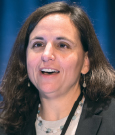For the past few decades, ASCO has led efforts to integrate palliative care into all phases of cancer treatment. Through numerous educational programs, advocacy efforts, and most recently, the first annual Palliative Care in Oncology Symposium, ASCO has championed the idea that palliative care, which includes symptom management, psychosocial counseling, and discussion about treatment goals and expectations, must be a service available for individuals with serious illness not only at the end of life, but from the moment of diagnosis.
Following the successes of the inaugural Palliative Care in Oncology Symposium last year (see infographic), the 2015 Symposium will be held on October 9–10, 2015, in Boston, and will strongly emphasize the science underlying palliative care. The Symposium will continue to serve as a platform for research on the social, spiritual, and communications-oriented aspects of palliative care and is again cosponsored by ASCO, the American Academy of Hospice and Palliative Medicine, the American Society for Radiation Oncology, and the Multinational Association of Supportive Care in Cancer.
Jennifer S. Temel, MD, Chair of the 2015 Palliative Care in Oncology Steering Committee, as well as Clinical Director of Thoracic Oncology at Massachusetts General Hospital, described the research that will be presented at the 2015 Symposium.
“One of our primary goals for this year’s meeting is to focus on the science of symptoms in patients with cancer. We have added two tracks covering both the science and treatment of two common and distressing symptoms in patients with cancer: pain and cachexia,” she said. “We will also have ample opportunity to discuss and review novel research in the field, ranging from survivorship to end-of-life care.”
Sessions will more fully integrate both the latest scientific research and valuable best practices regarding difficult conversations with patients about priorities throughout treatment and into the end of life. In keeping with last year, symptom management will be discussed, but this year there will also be discussion of the biologic mechanisms of symptoms. Several sessions will follow a topic from presentation of the latest laboratory research, through the effects of those data on clinical care, to information about psychological drivers for patients and their families.
A new case report series, “Putting the Person in Personalized Medicine,” has been added at the end of some sessions to better illustrate the session information in the context of the reality of patient care and the emotions that often accompany these issues. In addition, a session on nonpharmacologic interventions for pain, such as massage and music therapy, is being offered concurrently with a session focusing on the more translational mechanisms and management of pain. New programmatic features like these demonstrate mindfulness of the whole-patient perspective and allow the diverse audience members to better tailor their meeting experience.
The 2015 Symposium will also feature expanded opportunities for networking through such programs as the Fellows and Junior Faculty Lunch and expert-led Poster Walks. Meet the Faculty Networking Roundtables will provide an opportunity for attendees to network with colleagues across specialties, as well as with faculty and other experts in the field in a casual setting. In addition, a new, innovative approach to mentorship—Expert Office Hours—will allow for one-on-one mentoring conversations with faculty.
The Symposium will reprise one of the most popular programs at the 2014 Symposium—Death Cafés—forums that began in Europe and that allow people to engage in open, informal discussions about an often difficult-to-discuss topic: the end of life. Some events require advance registration, and ticketed events will allow seating for non–ticket holders on a first-come, first-served basis.
The early registration and housing deadline for the 2015 Palliative Care in Oncology Symposium is Wednesday, September 2, at 11:59 PM (EDT). Visit www.pallonc.org register, reserve housing, and view program information. ■
Selected portions reprinted from ASCO Daily News. © American Society of Clinical Oncology. “ASCO Leads the Way in Innovative Palliative Care Education.” https://am.asco.org/asco-leads-way-innovative-palliative-care-education. All rights reserved.


